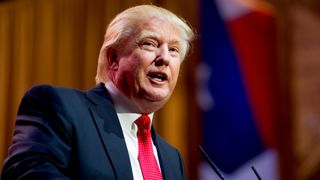Trump piles pressure on Apple to unlock Pensacola shooter's iPhone
US President suggests action should be taken as part of a quid pro quo

President Donald Trump has joined a number of senior US officials in calling for Apple to unlock an iPhone said to belong to the suspect accused of killing three military personnel on a Navy base in Florida in December 2019.
Taking to Twitter, Trump said that Apple "refuse to unlock phones used by killers, drug dealers and other violent criminal elements" despite receiving favourable attention from his administration.
He added that the company needs to "step up to the plate and help our great country".
His comments follow those made by US Attorney William Barr, who said that Apple had failed to give any "substantive assistance".
Speaking at a press conference on Monday, Barr said: "This situation perfectly illustrates why it is critical that the public be able to get access to digital evidence."
Officials are calling on Apple to unlock two iPhones said to belong to Second Lieutenant Mohammed Saeed Alshamrani, a member of the Saudi air force assigned to train with the US Military. He is alleged to have shot and killed three sailors and wounding eight others in an attack at the Pensacola Navy base in Florida. He was killed by police on the scene following a shootout.
Apple, however, has long maintained that the act of breaking into a locked iPhone is not something the company is physically able to do and would require the creation of software 'back doors' that would threaten the security of customers. The company has also argued that being compelled to write such software would amount to a breach of the First Amendment, which includes protection of freedom of speech, and that a great deal of the data being sought by law enforcement is also collected by other agencies, such as telecommunications companies.
Get the ITPro. daily newsletter
Receive our latest news, industry updates, featured resources and more. Sign up today to receive our FREE report on AI cyber crime & security - newly updated for 2024.
Following requests from the FBI, Apple said it had responded "promptly, often within hours", according to a statement provided to CNET.
"The queries resulted in many gigabytes of information that we turned over to investigators. In every instance, we responded with all of the information that we had," the company said in a statement, although this was restricted to cloud data only.
The case echoes similar attempts by the FBI to access an iPhone belonging to Sutherland Springs shooter Devin Kelley, who in 2017 perpetrated the deadliest mass shooting in Texas history when he opened fire inside the First Baptist Church, killing 26 people and wounding 20 others.
In that instance, the FBI issued warrants to Apple demanding its assistance in unlocking an iPhone SE, as well as the perpetrators iCloud account. To this day, authorities have been unable to gain access to the attacker's data.
In 2015, in another deadly mass shooting at San Bernardino, authorities chose to initially bypass Apple by attempting to unlock an iPhone manually. This was unsuccessful, although police would eventually gain access with the help of a third-party company.
Throughout 2015 and 2016 alone, Apple received at least 11 orders from US district courts demanding it provide law enforcement access to data, all of which were objected to or challenged.
Dale Walker is the Managing Editor of ITPro, and its sibling sites CloudPro and ChannelPro. Dale has a keen interest in IT regulations, data protection, and cyber security. He spent a number of years reporting for ITPro from numerous domestic and international events, including IBM, Red Hat, Google, and has been a regular reporter for Microsoft's various yearly showcases, including Ignite.





